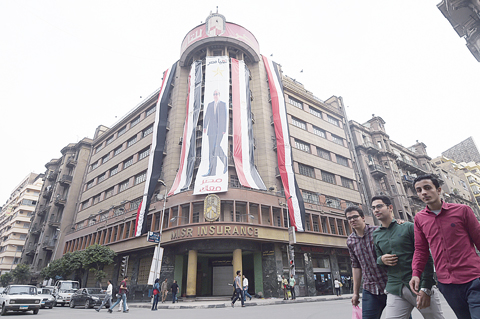Fond of telling Egyptians that they are the apple of his eye
 CAIRO: A picture taken on March 22, 2018 shows a giant election campaign poster supporting Egyptian President Abdelfattah Al-Sisi in the upcoming presidential election. —AFP
CAIRO: A picture taken on March 22, 2018 shows a giant election campaign poster supporting Egyptian President Abdelfattah Al-Sisi in the upcoming presidential election. —AFPCAIRO: With his trademark black sunglasses and blanket media presence, Egypt's President Abdel Fattah Al-Sisi projects an air of benign paternalism. Whether the people love or loathe Sisi, see him as a bulwark of stability or as a domineering autocrat-there is little doubt that he will remain Egypt's president for years to come.
He stormed to victory in the 2014 presidential election, having led the military a year before in ousting the North African country's first freely-elected leader, the Islamist Mohamed Morsi. Morsi now languishes in jail, convicted on many and varied counts and sentenced to multiple terms including the death penalty. Sisi successfully silenced all forms of political opposition during his first four-year term.
This has included sweeping aside all token opposition in the March 26-28 election, leaving himself as the main choice on the ballot paper. The sole remaining challenger is Moussa Mostafa Moussa, an ardent Sisi supporter who announced his candidacy at the last minute just as it seemed Sisi would have to run alone. Sisi later denied involvement in sidelining his opponents, saying he wished there were many candidates. The former career army officer was born in November 1954 in El-Gamaleya neighborhood in the heart of Islamic Cairo.
Even as a child, Sisi sought to exert control over those around him, according to people who knew him at the time. He graduated from Egypt's Military Academy in 1977, later studying in Britain and the United States, before becoming military intelligence chief under President Hosni Mubarak who was toppled in a January 2011 uprising.
There to serve
As Egypt's leader, Sisi is often seen microphone in hand, presiding over public ceremonies. Speaking in the Egyptian Arabic dialect, sometimes laughing in the middle of his own lengthy speeches, he projects an image of father of the nation. He is fond of telling Egyptians that they are the apple of his eye, stressing that he is there only to serve them.
Enjoying near-unanimous media support, Sisi is popular among many Egyptians who see him as the right man to lead the country after years of political, security, and economic turmoil that followed the ouster of long-time president Mubarak. A father of four whose wife wears a hair veil, Sisi is described by those close to him as a pious Muslim who does not miss any of the five daily prayers. But he is also reported to have a strong sense of self-belief, with audio records leaked by Islamic-leaning media pointing to a big ego.
In one leak, Sisi recalls a dream about the late president Anwar Sadat, which he saw as an omen that he would one day become powerful himself. In another, he tells of a dream in which he held a red sword inscribed with the Muslim declaration of faith. Ironically, it was the Islamist Morsi himself who appointed Sisi defense minister and commander-in-chief of the armed forces in 2012.
Security problems
A year later, Sisi ended Morsi's turbulent year in power and cracked down on the Islamist's supporters, with hundreds of people killed in weeks. On one bloody day-August 14, 2013 -- security forces killed more than 700 people in Cairo when they dispersed sit-ins by pro-Morsi protesters. At the time, Human Rights Watch said the "mass killings of protesters" that day "probably amounts to crimes against humanity".
Since Morsi's removal, tens of thousands of his followers have been jailed, and hundreds sentenced in expedient mass trials strongly denounced by the United Nations. As Islamist-related security issues mounted, Sisi launched a military campaign against Islamic State group fighters based in North Sinai province. But so far he has been unable to fully quash an insurgency that has killed hundreds of police and military personnel.
Economically, he has begun an IMF-mandated campaign of drastic economic reforms that include cutting energy subsidies, introducing value-added tax and floating the pound. Many secular and left-wing activists who initially supported Sisi soon came to regret it: he has been regularly accused by international rights groups of committing serious violations to silence dissent. During his first presidential campaign in 2014, he said that "talking about freedoms" should not take precedence over "national security", and that it would take "20 to 25 years to establish a true democracy" in Egypt. - AFP










